BTEC Level 5 Organisational Behaviour Report: Culture, Politics, Power
VerifiedAdded on 2023/06/09
|12
|3793
|279
Report
AI Summary
This report delves into the realm of organisational behaviour, examining the intricate interplay of culture, politics, and power within the context of TESCO, a leading supermarket brand. The report begins with an introduction to organisational behaviour, defining its core concepts and fundamental assumptions. The main body of the report is divided into two key tasks. Task 1 explores the influence of culture, politics, and power on employee behaviour within the organisation. It analyses the impact of organisational culture on individual and team performance, the effects of organisational politics, and the role of power dynamics. Task 2 focuses on the elements that contribute to effective and ineffective teams, applying organisational behaviour concepts to a given business scenario. Furthermore, the report evaluates content and process theories of motivation, alongside motivational techniques. The report concludes with a comprehensive overview of the findings and provides relevant references to support its analysis. This report aims to offer insights into the impact of organisational behaviour on people and the overall performance of TESCO.
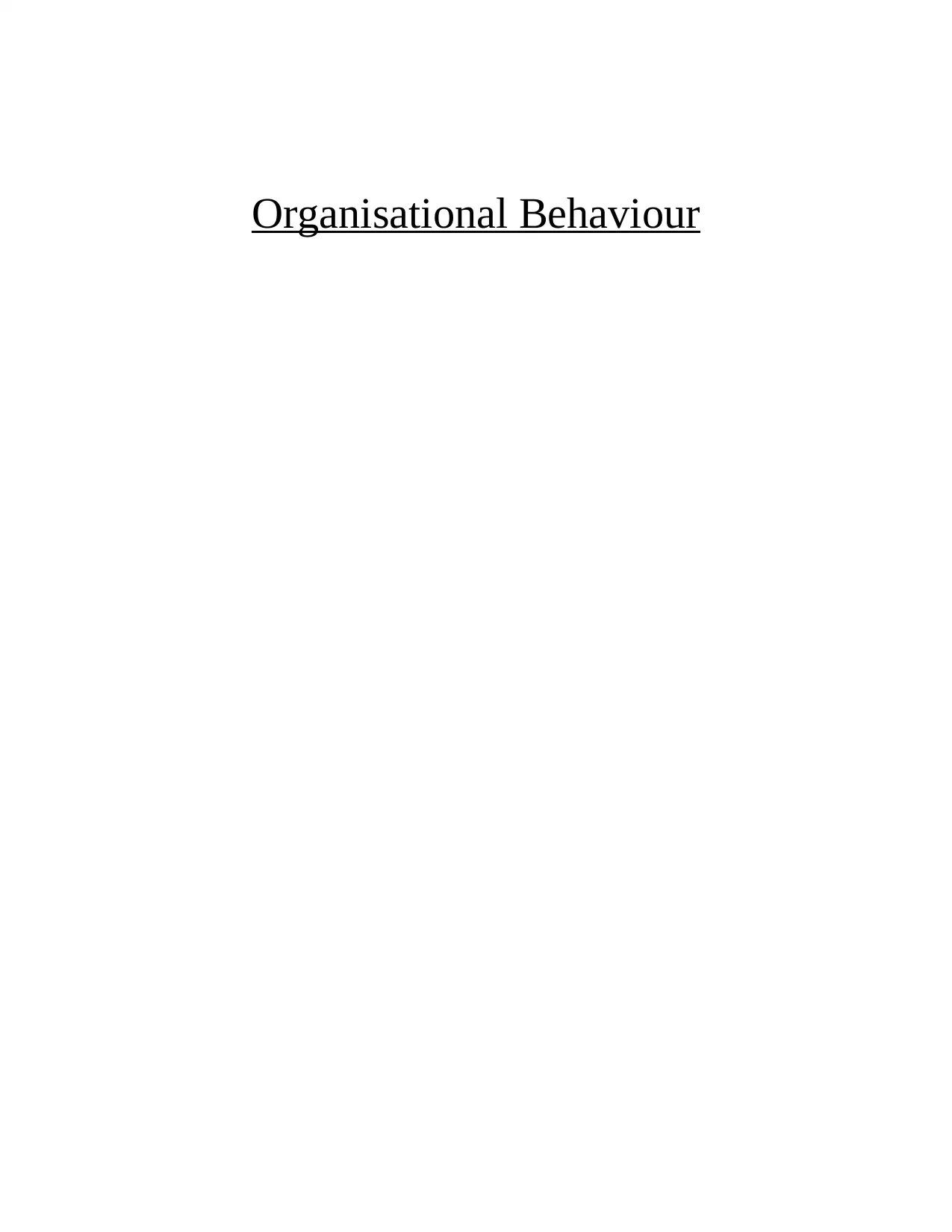
Organisational Behaviour
Paraphrase This Document
Need a fresh take? Get an instant paraphrase of this document with our AI Paraphraser
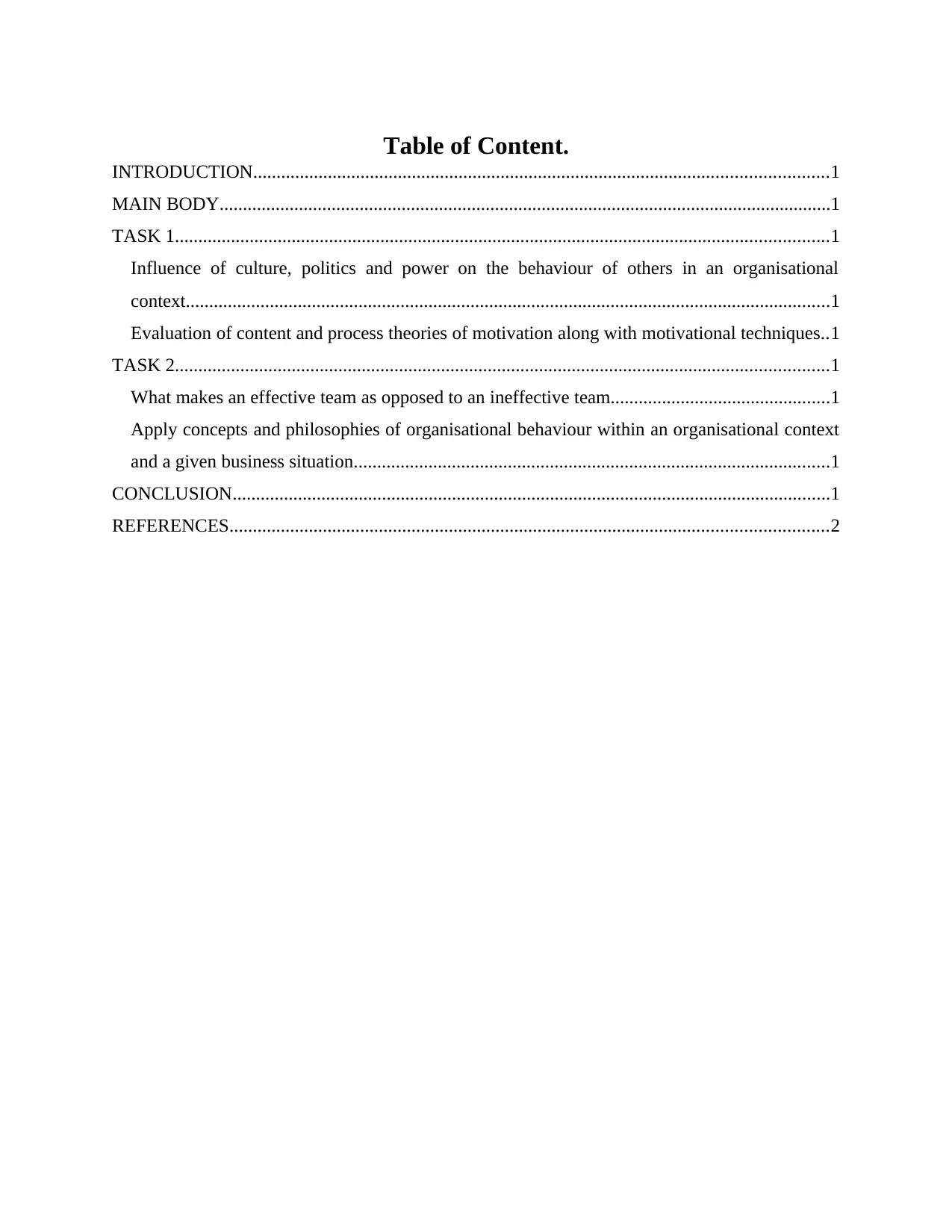
Table of Content.
INTRODUCTION...........................................................................................................................1
MAIN BODY...................................................................................................................................1
TASK 1............................................................................................................................................1
Influence of culture, politics and power on the behaviour of others in an organisational
context..........................................................................................................................................1
Evaluation of content and process theories of motivation along with motivational techniques..1
TASK 2............................................................................................................................................1
What makes an effective team as opposed to an ineffective team...............................................1
Apply concepts and philosophies of organisational behaviour within an organisational context
and a given business situation......................................................................................................1
CONCLUSION................................................................................................................................1
REFERENCES................................................................................................................................2
INTRODUCTION...........................................................................................................................1
MAIN BODY...................................................................................................................................1
TASK 1............................................................................................................................................1
Influence of culture, politics and power on the behaviour of others in an organisational
context..........................................................................................................................................1
Evaluation of content and process theories of motivation along with motivational techniques..1
TASK 2............................................................................................................................................1
What makes an effective team as opposed to an ineffective team...............................................1
Apply concepts and philosophies of organisational behaviour within an organisational context
and a given business situation......................................................................................................1
CONCLUSION................................................................................................................................1
REFERENCES................................................................................................................................2
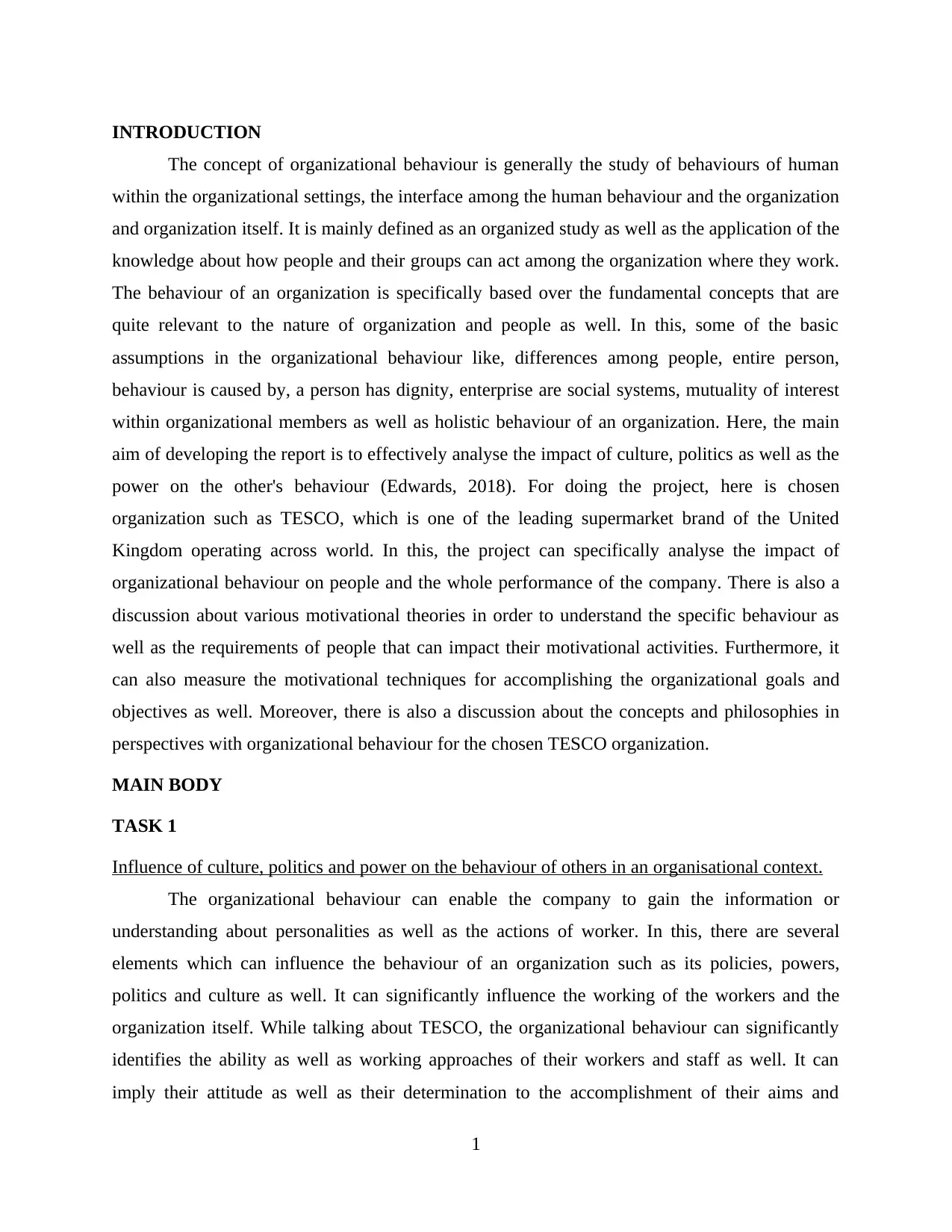
INTRODUCTION
The concept of organizational behaviour is generally the study of behaviours of human
within the organizational settings, the interface among the human behaviour and the organization
and organization itself. It is mainly defined as an organized study as well as the application of the
knowledge about how people and their groups can act among the organization where they work.
The behaviour of an organization is specifically based over the fundamental concepts that are
quite relevant to the nature of organization and people as well. In this, some of the basic
assumptions in the organizational behaviour like, differences among people, entire person,
behaviour is caused by, a person has dignity, enterprise are social systems, mutuality of interest
within organizational members as well as holistic behaviour of an organization. Here, the main
aim of developing the report is to effectively analyse the impact of culture, politics as well as the
power on the other's behaviour (Edwards, 2018). For doing the project, here is chosen
organization such as TESCO, which is one of the leading supermarket brand of the United
Kingdom operating across world. In this, the project can specifically analyse the impact of
organizational behaviour on people and the whole performance of the company. There is also a
discussion about various motivational theories in order to understand the specific behaviour as
well as the requirements of people that can impact their motivational activities. Furthermore, it
can also measure the motivational techniques for accomplishing the organizational goals and
objectives as well. Moreover, there is also a discussion about the concepts and philosophies in
perspectives with organizational behaviour for the chosen TESCO organization.
MAIN BODY
TASK 1
Influence of culture, politics and power on the behaviour of others in an organisational context.
The organizational behaviour can enable the company to gain the information or
understanding about personalities as well as the actions of worker. In this, there are several
elements which can influence the behaviour of an organization such as its policies, powers,
politics and culture as well. It can significantly influence the working of the workers and the
organization itself. While talking about TESCO, the organizational behaviour can significantly
identifies the ability as well as working approaches of their workers and staff as well. It can
imply their attitude as well as their determination to the accomplishment of their aims and
1
The concept of organizational behaviour is generally the study of behaviours of human
within the organizational settings, the interface among the human behaviour and the organization
and organization itself. It is mainly defined as an organized study as well as the application of the
knowledge about how people and their groups can act among the organization where they work.
The behaviour of an organization is specifically based over the fundamental concepts that are
quite relevant to the nature of organization and people as well. In this, some of the basic
assumptions in the organizational behaviour like, differences among people, entire person,
behaviour is caused by, a person has dignity, enterprise are social systems, mutuality of interest
within organizational members as well as holistic behaviour of an organization. Here, the main
aim of developing the report is to effectively analyse the impact of culture, politics as well as the
power on the other's behaviour (Edwards, 2018). For doing the project, here is chosen
organization such as TESCO, which is one of the leading supermarket brand of the United
Kingdom operating across world. In this, the project can specifically analyse the impact of
organizational behaviour on people and the whole performance of the company. There is also a
discussion about various motivational theories in order to understand the specific behaviour as
well as the requirements of people that can impact their motivational activities. Furthermore, it
can also measure the motivational techniques for accomplishing the organizational goals and
objectives as well. Moreover, there is also a discussion about the concepts and philosophies in
perspectives with organizational behaviour for the chosen TESCO organization.
MAIN BODY
TASK 1
Influence of culture, politics and power on the behaviour of others in an organisational context.
The organizational behaviour can enable the company to gain the information or
understanding about personalities as well as the actions of worker. In this, there are several
elements which can influence the behaviour of an organization such as its policies, powers,
politics and culture as well. It can significantly influence the working of the workers and the
organization itself. While talking about TESCO, the organizational behaviour can significantly
identifies the ability as well as working approaches of their workers and staff as well. It can
imply their attitude as well as their determination to the accomplishment of their aims and
1
⊘ This is a preview!⊘
Do you want full access?
Subscribe today to unlock all pages.

Trusted by 1+ million students worldwide
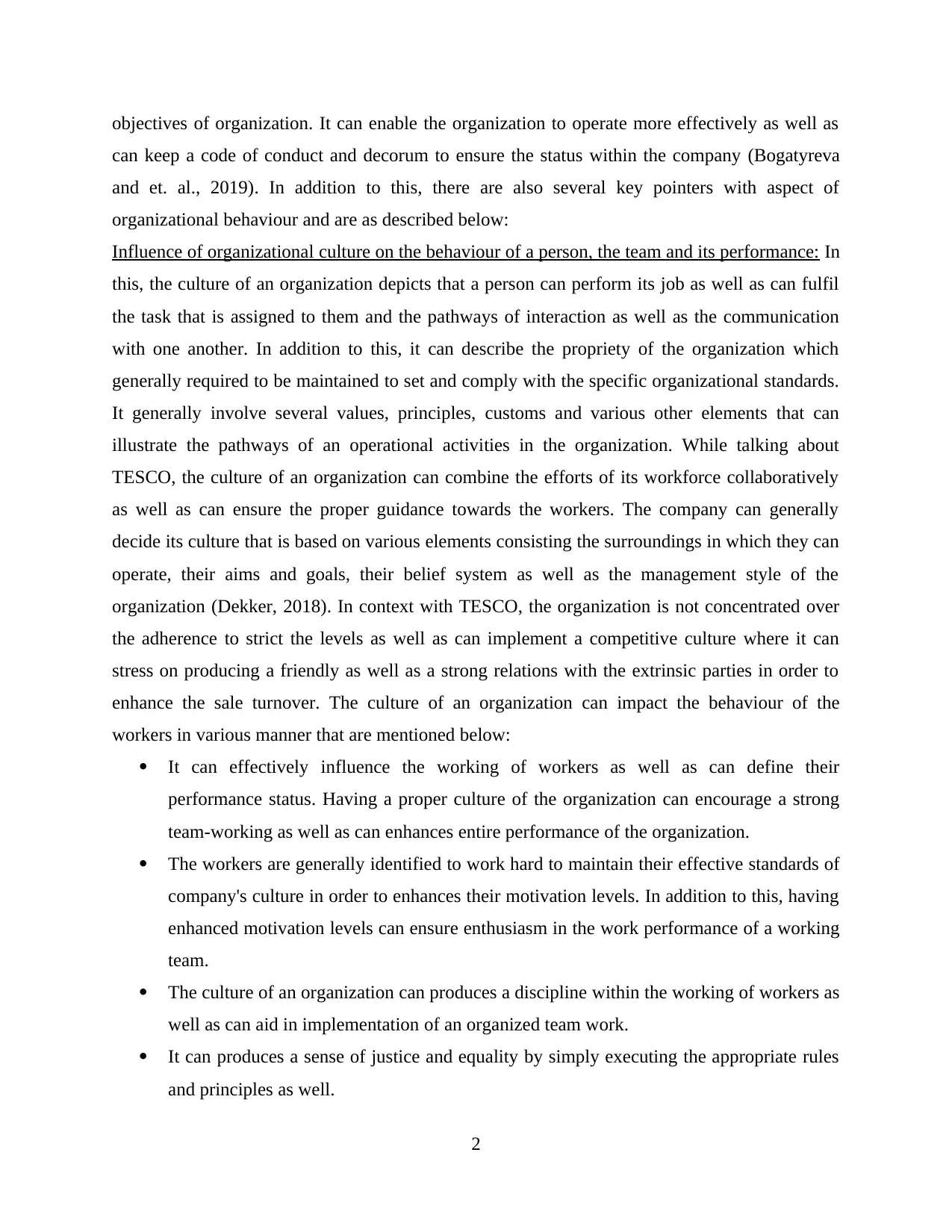
objectives of organization. It can enable the organization to operate more effectively as well as
can keep a code of conduct and decorum to ensure the status within the company (Bogatyreva
and et. al., 2019). In addition to this, there are also several key pointers with aspect of
organizational behaviour and are as described below:
Influence of organizational culture on the behaviour of a person, the team and its performance: In
this, the culture of an organization depicts that a person can perform its job as well as can fulfil
the task that is assigned to them and the pathways of interaction as well as the communication
with one another. In addition to this, it can describe the propriety of the organization which
generally required to be maintained to set and comply with the specific organizational standards.
It generally involve several values, principles, customs and various other elements that can
illustrate the pathways of an operational activities in the organization. While talking about
TESCO, the culture of an organization can combine the efforts of its workforce collaboratively
as well as can ensure the proper guidance towards the workers. The company can generally
decide its culture that is based on various elements consisting the surroundings in which they can
operate, their aims and goals, their belief system as well as the management style of the
organization (Dekker, 2018). In context with TESCO, the organization is not concentrated over
the adherence to strict the levels as well as can implement a competitive culture where it can
stress on producing a friendly as well as a strong relations with the extrinsic parties in order to
enhance the sale turnover. The culture of an organization can impact the behaviour of the
workers in various manner that are mentioned below:
It can effectively influence the working of workers as well as can define their
performance status. Having a proper culture of the organization can encourage a strong
team-working as well as can enhances entire performance of the organization.
The workers are generally identified to work hard to maintain their effective standards of
company's culture in order to enhances their motivation levels. In addition to this, having
enhanced motivation levels can ensure enthusiasm in the work performance of a working
team.
The culture of an organization can produces a discipline within the working of workers as
well as can aid in implementation of an organized team work.
It can produces a sense of justice and equality by simply executing the appropriate rules
and principles as well.
2
can keep a code of conduct and decorum to ensure the status within the company (Bogatyreva
and et. al., 2019). In addition to this, there are also several key pointers with aspect of
organizational behaviour and are as described below:
Influence of organizational culture on the behaviour of a person, the team and its performance: In
this, the culture of an organization depicts that a person can perform its job as well as can fulfil
the task that is assigned to them and the pathways of interaction as well as the communication
with one another. In addition to this, it can describe the propriety of the organization which
generally required to be maintained to set and comply with the specific organizational standards.
It generally involve several values, principles, customs and various other elements that can
illustrate the pathways of an operational activities in the organization. While talking about
TESCO, the culture of an organization can combine the efforts of its workforce collaboratively
as well as can ensure the proper guidance towards the workers. The company can generally
decide its culture that is based on various elements consisting the surroundings in which they can
operate, their aims and goals, their belief system as well as the management style of the
organization (Dekker, 2018). In context with TESCO, the organization is not concentrated over
the adherence to strict the levels as well as can implement a competitive culture where it can
stress on producing a friendly as well as a strong relations with the extrinsic parties in order to
enhance the sale turnover. The culture of an organization can impact the behaviour of the
workers in various manner that are mentioned below:
It can effectively influence the working of workers as well as can define their
performance status. Having a proper culture of the organization can encourage a strong
team-working as well as can enhances entire performance of the organization.
The workers are generally identified to work hard to maintain their effective standards of
company's culture in order to enhances their motivation levels. In addition to this, having
enhanced motivation levels can ensure enthusiasm in the work performance of a working
team.
The culture of an organization can produces a discipline within the working of workers as
well as can aid in implementation of an organized team work.
It can produces a sense of justice and equality by simply executing the appropriate rules
and principles as well.
2
Paraphrase This Document
Need a fresh take? Get an instant paraphrase of this document with our AI Paraphraser
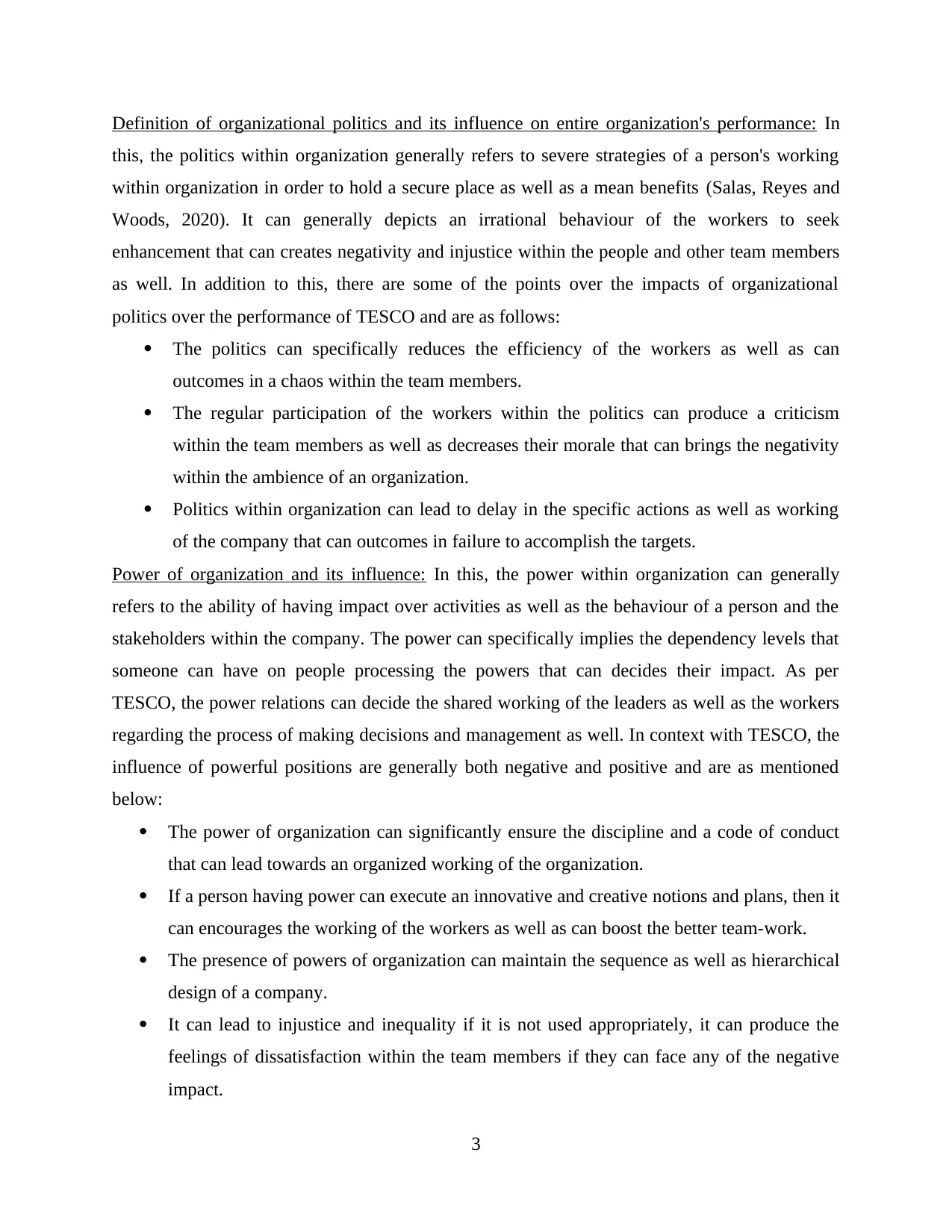
Definition of organizational politics and its influence on entire organization's performance: In
this, the politics within organization generally refers to severe strategies of a person's working
within organization in order to hold a secure place as well as a mean benefits (Salas, Reyes and
Woods, 2020). It can generally depicts an irrational behaviour of the workers to seek
enhancement that can creates negativity and injustice within the people and other team members
as well. In addition to this, there are some of the points over the impacts of organizational
politics over the performance of TESCO and are as follows:
The politics can specifically reduces the efficiency of the workers as well as can
outcomes in a chaos within the team members.
The regular participation of the workers within the politics can produce a criticism
within the team members as well as decreases their morale that can brings the negativity
within the ambience of an organization.
Politics within organization can lead to delay in the specific actions as well as working
of the company that can outcomes in failure to accomplish the targets.
Power of organization and its influence: In this, the power within organization can generally
refers to the ability of having impact over activities as well as the behaviour of a person and the
stakeholders within the company. The power can specifically implies the dependency levels that
someone can have on people processing the powers that can decides their impact. As per
TESCO, the power relations can decide the shared working of the leaders as well as the workers
regarding the process of making decisions and management as well. In context with TESCO, the
influence of powerful positions are generally both negative and positive and are as mentioned
below:
The power of organization can significantly ensure the discipline and a code of conduct
that can lead towards an organized working of the organization.
If a person having power can execute an innovative and creative notions and plans, then it
can encourages the working of the workers as well as can boost the better team-work.
The presence of powers of organization can maintain the sequence as well as hierarchical
design of a company.
It can lead to injustice and inequality if it is not used appropriately, it can produce the
feelings of dissatisfaction within the team members if they can face any of the negative
impact.
3
this, the politics within organization generally refers to severe strategies of a person's working
within organization in order to hold a secure place as well as a mean benefits (Salas, Reyes and
Woods, 2020). It can generally depicts an irrational behaviour of the workers to seek
enhancement that can creates negativity and injustice within the people and other team members
as well. In addition to this, there are some of the points over the impacts of organizational
politics over the performance of TESCO and are as follows:
The politics can specifically reduces the efficiency of the workers as well as can
outcomes in a chaos within the team members.
The regular participation of the workers within the politics can produce a criticism
within the team members as well as decreases their morale that can brings the negativity
within the ambience of an organization.
Politics within organization can lead to delay in the specific actions as well as working
of the company that can outcomes in failure to accomplish the targets.
Power of organization and its influence: In this, the power within organization can generally
refers to the ability of having impact over activities as well as the behaviour of a person and the
stakeholders within the company. The power can specifically implies the dependency levels that
someone can have on people processing the powers that can decides their impact. As per
TESCO, the power relations can decide the shared working of the leaders as well as the workers
regarding the process of making decisions and management as well. In context with TESCO, the
influence of powerful positions are generally both negative and positive and are as mentioned
below:
The power of organization can significantly ensure the discipline and a code of conduct
that can lead towards an organized working of the organization.
If a person having power can execute an innovative and creative notions and plans, then it
can encourages the working of the workers as well as can boost the better team-work.
The presence of powers of organization can maintain the sequence as well as hierarchical
design of a company.
It can lead to injustice and inequality if it is not used appropriately, it can produce the
feelings of dissatisfaction within the team members if they can face any of the negative
impact.
3
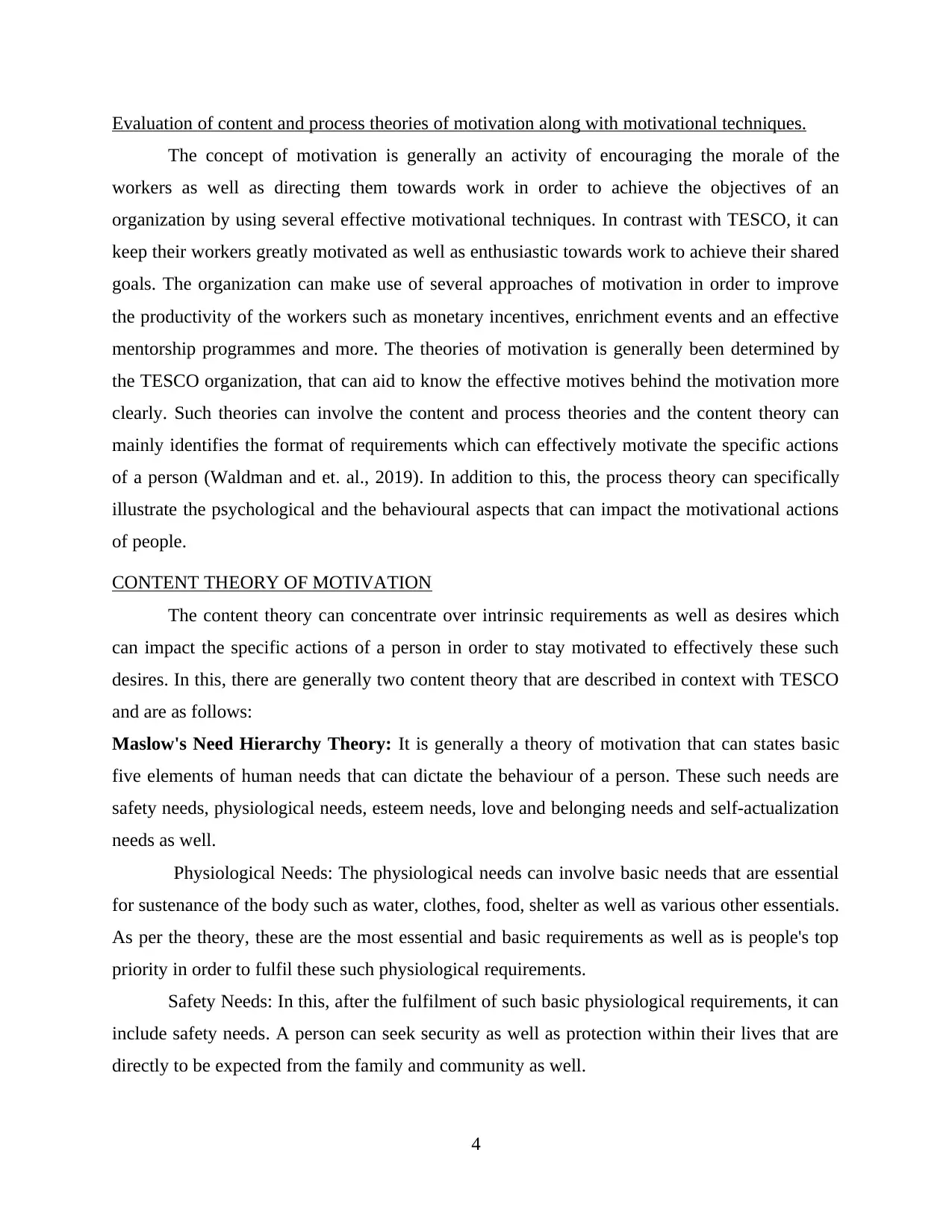
Evaluation of content and process theories of motivation along with motivational techniques.
The concept of motivation is generally an activity of encouraging the morale of the
workers as well as directing them towards work in order to achieve the objectives of an
organization by using several effective motivational techniques. In contrast with TESCO, it can
keep their workers greatly motivated as well as enthusiastic towards work to achieve their shared
goals. The organization can make use of several approaches of motivation in order to improve
the productivity of the workers such as monetary incentives, enrichment events and an effective
mentorship programmes and more. The theories of motivation is generally been determined by
the TESCO organization, that can aid to know the effective motives behind the motivation more
clearly. Such theories can involve the content and process theories and the content theory can
mainly identifies the format of requirements which can effectively motivate the specific actions
of a person (Waldman and et. al., 2019). In addition to this, the process theory can specifically
illustrate the psychological and the behavioural aspects that can impact the motivational actions
of people.
CONTENT THEORY OF MOTIVATION
The content theory can concentrate over intrinsic requirements as well as desires which
can impact the specific actions of a person in order to stay motivated to effectively these such
desires. In this, there are generally two content theory that are described in context with TESCO
and are as follows:
Maslow's Need Hierarchy Theory: It is generally a theory of motivation that can states basic
five elements of human needs that can dictate the behaviour of a person. These such needs are
safety needs, physiological needs, esteem needs, love and belonging needs and self-actualization
needs as well.
Physiological Needs: The physiological needs can involve basic needs that are essential
for sustenance of the body such as water, clothes, food, shelter as well as various other essentials.
As per the theory, these are the most essential and basic requirements as well as is people's top
priority in order to fulfil these such physiological requirements.
Safety Needs: In this, after the fulfilment of such basic physiological requirements, it can
include safety needs. A person can seek security as well as protection within their lives that are
directly to be expected from the family and community as well.
4
The concept of motivation is generally an activity of encouraging the morale of the
workers as well as directing them towards work in order to achieve the objectives of an
organization by using several effective motivational techniques. In contrast with TESCO, it can
keep their workers greatly motivated as well as enthusiastic towards work to achieve their shared
goals. The organization can make use of several approaches of motivation in order to improve
the productivity of the workers such as monetary incentives, enrichment events and an effective
mentorship programmes and more. The theories of motivation is generally been determined by
the TESCO organization, that can aid to know the effective motives behind the motivation more
clearly. Such theories can involve the content and process theories and the content theory can
mainly identifies the format of requirements which can effectively motivate the specific actions
of a person (Waldman and et. al., 2019). In addition to this, the process theory can specifically
illustrate the psychological and the behavioural aspects that can impact the motivational actions
of people.
CONTENT THEORY OF MOTIVATION
The content theory can concentrate over intrinsic requirements as well as desires which
can impact the specific actions of a person in order to stay motivated to effectively these such
desires. In this, there are generally two content theory that are described in context with TESCO
and are as follows:
Maslow's Need Hierarchy Theory: It is generally a theory of motivation that can states basic
five elements of human needs that can dictate the behaviour of a person. These such needs are
safety needs, physiological needs, esteem needs, love and belonging needs and self-actualization
needs as well.
Physiological Needs: The physiological needs can involve basic needs that are essential
for sustenance of the body such as water, clothes, food, shelter as well as various other essentials.
As per the theory, these are the most essential and basic requirements as well as is people's top
priority in order to fulfil these such physiological requirements.
Safety Needs: In this, after the fulfilment of such basic physiological requirements, it can
include safety needs. A person can seek security as well as protection within their lives that are
directly to be expected from the family and community as well.
4
⊘ This is a preview!⊘
Do you want full access?
Subscribe today to unlock all pages.

Trusted by 1+ million students worldwide
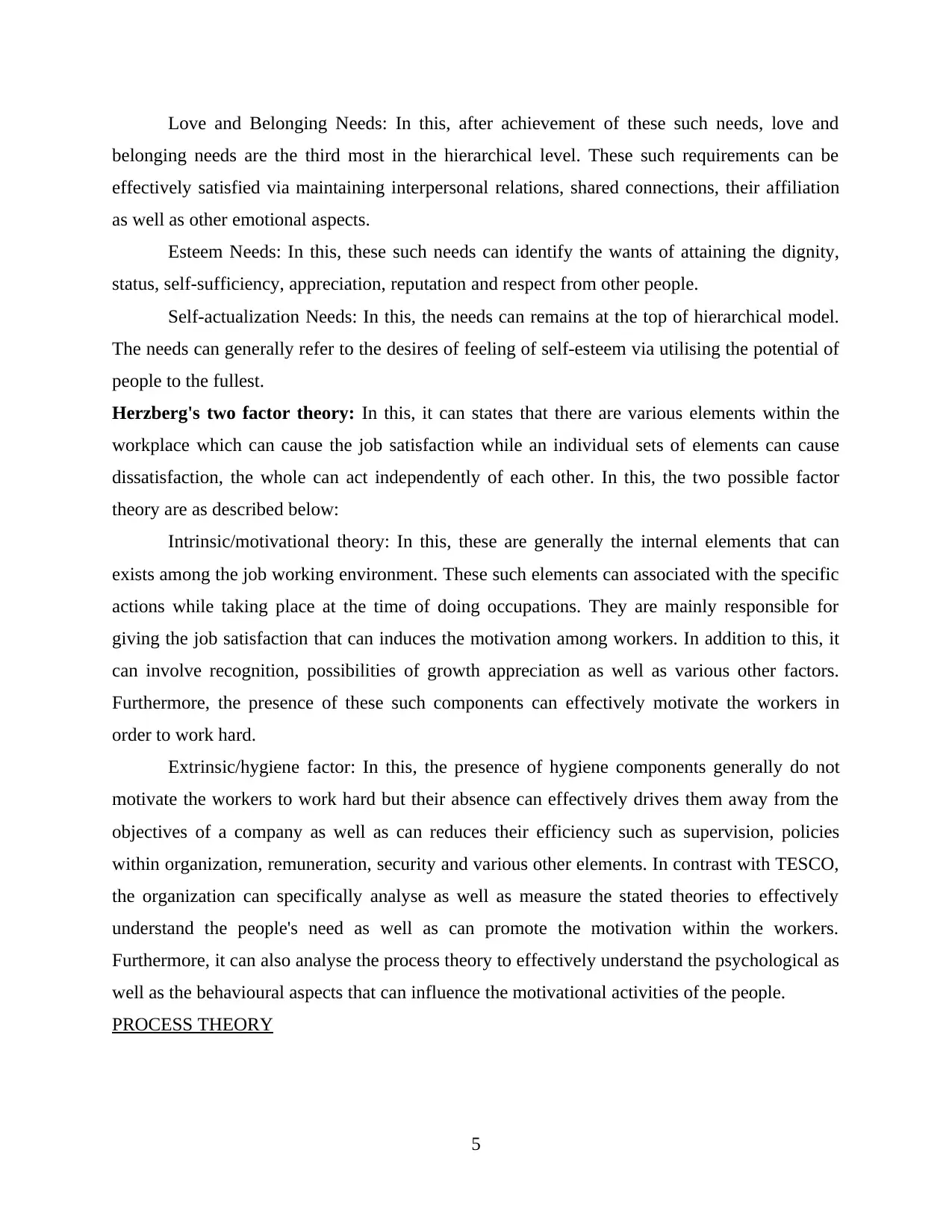
Love and Belonging Needs: In this, after achievement of these such needs, love and
belonging needs are the third most in the hierarchical level. These such requirements can be
effectively satisfied via maintaining interpersonal relations, shared connections, their affiliation
as well as other emotional aspects.
Esteem Needs: In this, these such needs can identify the wants of attaining the dignity,
status, self-sufficiency, appreciation, reputation and respect from other people.
Self-actualization Needs: In this, the needs can remains at the top of hierarchical model.
The needs can generally refer to the desires of feeling of self-esteem via utilising the potential of
people to the fullest.
Herzberg's two factor theory: In this, it can states that there are various elements within the
workplace which can cause the job satisfaction while an individual sets of elements can cause
dissatisfaction, the whole can act independently of each other. In this, the two possible factor
theory are as described below:
Intrinsic/motivational theory: In this, these are generally the internal elements that can
exists among the job working environment. These such elements can associated with the specific
actions while taking place at the time of doing occupations. They are mainly responsible for
giving the job satisfaction that can induces the motivation among workers. In addition to this, it
can involve recognition, possibilities of growth appreciation as well as various other factors.
Furthermore, the presence of these such components can effectively motivate the workers in
order to work hard.
Extrinsic/hygiene factor: In this, the presence of hygiene components generally do not
motivate the workers to work hard but their absence can effectively drives them away from the
objectives of a company as well as can reduces their efficiency such as supervision, policies
within organization, remuneration, security and various other elements. In contrast with TESCO,
the organization can specifically analyse as well as measure the stated theories to effectively
understand the people's need as well as can promote the motivation within the workers.
Furthermore, it can also analyse the process theory to effectively understand the psychological as
well as the behavioural aspects that can influence the motivational activities of the people.
PROCESS THEORY
5
belonging needs are the third most in the hierarchical level. These such requirements can be
effectively satisfied via maintaining interpersonal relations, shared connections, their affiliation
as well as other emotional aspects.
Esteem Needs: In this, these such needs can identify the wants of attaining the dignity,
status, self-sufficiency, appreciation, reputation and respect from other people.
Self-actualization Needs: In this, the needs can remains at the top of hierarchical model.
The needs can generally refer to the desires of feeling of self-esteem via utilising the potential of
people to the fullest.
Herzberg's two factor theory: In this, it can states that there are various elements within the
workplace which can cause the job satisfaction while an individual sets of elements can cause
dissatisfaction, the whole can act independently of each other. In this, the two possible factor
theory are as described below:
Intrinsic/motivational theory: In this, these are generally the internal elements that can
exists among the job working environment. These such elements can associated with the specific
actions while taking place at the time of doing occupations. They are mainly responsible for
giving the job satisfaction that can induces the motivation among workers. In addition to this, it
can involve recognition, possibilities of growth appreciation as well as various other factors.
Furthermore, the presence of these such components can effectively motivate the workers in
order to work hard.
Extrinsic/hygiene factor: In this, the presence of hygiene components generally do not
motivate the workers to work hard but their absence can effectively drives them away from the
objectives of a company as well as can reduces their efficiency such as supervision, policies
within organization, remuneration, security and various other elements. In contrast with TESCO,
the organization can specifically analyse as well as measure the stated theories to effectively
understand the people's need as well as can promote the motivation within the workers.
Furthermore, it can also analyse the process theory to effectively understand the psychological as
well as the behavioural aspects that can influence the motivational activities of the people.
PROCESS THEORY
5
Paraphrase This Document
Need a fresh take? Get an instant paraphrase of this document with our AI Paraphraser
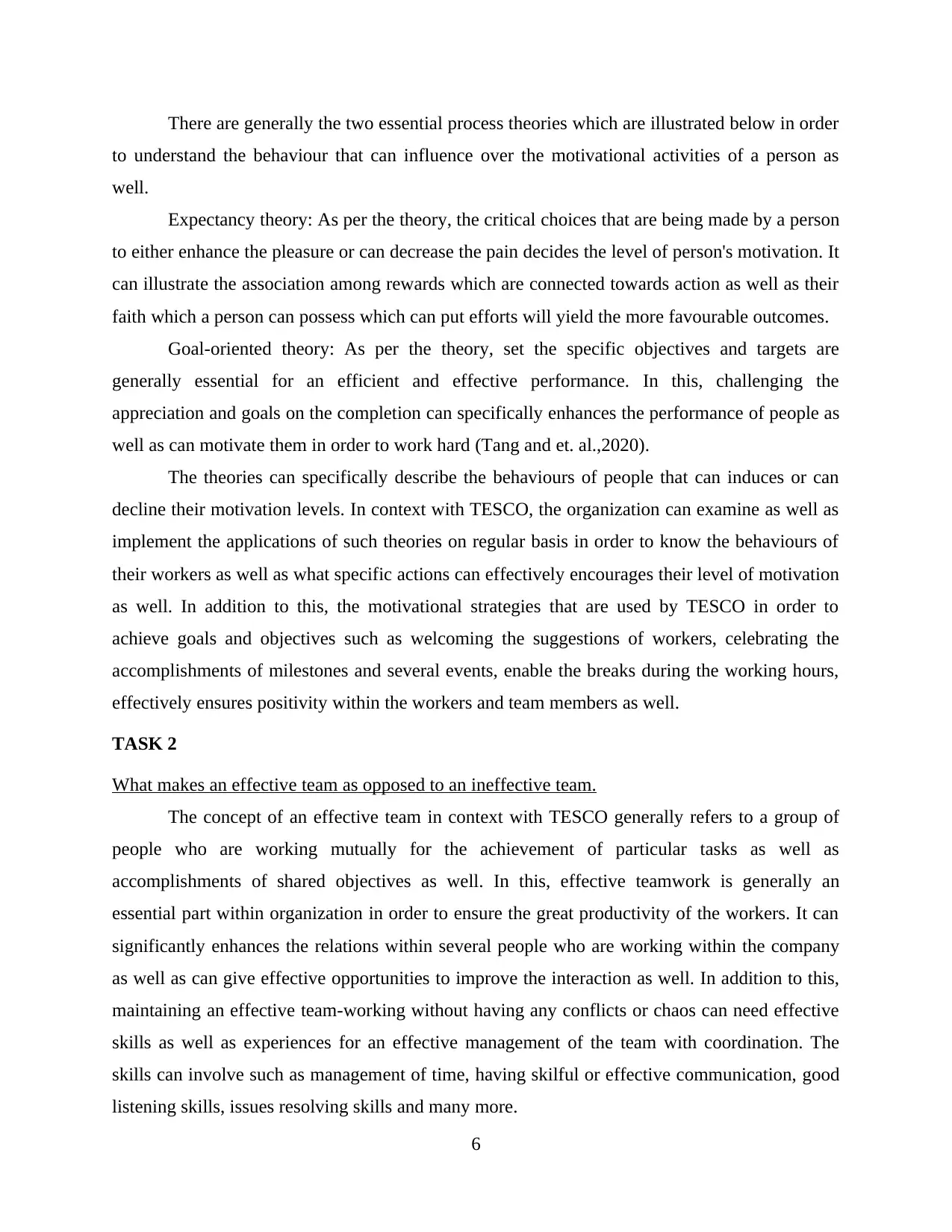
There are generally the two essential process theories which are illustrated below in order
to understand the behaviour that can influence over the motivational activities of a person as
well.
Expectancy theory: As per the theory, the critical choices that are being made by a person
to either enhance the pleasure or can decrease the pain decides the level of person's motivation. It
can illustrate the association among rewards which are connected towards action as well as their
faith which a person can possess which can put efforts will yield the more favourable outcomes.
Goal-oriented theory: As per the theory, set the specific objectives and targets are
generally essential for an efficient and effective performance. In this, challenging the
appreciation and goals on the completion can specifically enhances the performance of people as
well as can motivate them in order to work hard (Tang and et. al.,2020).
The theories can specifically describe the behaviours of people that can induces or can
decline their motivation levels. In context with TESCO, the organization can examine as well as
implement the applications of such theories on regular basis in order to know the behaviours of
their workers as well as what specific actions can effectively encourages their level of motivation
as well. In addition to this, the motivational strategies that are used by TESCO in order to
achieve goals and objectives such as welcoming the suggestions of workers, celebrating the
accomplishments of milestones and several events, enable the breaks during the working hours,
effectively ensures positivity within the workers and team members as well.
TASK 2
What makes an effective team as opposed to an ineffective team.
The concept of an effective team in context with TESCO generally refers to a group of
people who are working mutually for the achievement of particular tasks as well as
accomplishments of shared objectives as well. In this, effective teamwork is generally an
essential part within organization in order to ensure the great productivity of the workers. It can
significantly enhances the relations within several people who are working within the company
as well as can give effective opportunities to improve the interaction as well. In addition to this,
maintaining an effective team-working without having any conflicts or chaos can need effective
skills as well as experiences for an effective management of the team with coordination. The
skills can involve such as management of time, having skilful or effective communication, good
listening skills, issues resolving skills and many more.
6
to understand the behaviour that can influence over the motivational activities of a person as
well.
Expectancy theory: As per the theory, the critical choices that are being made by a person
to either enhance the pleasure or can decrease the pain decides the level of person's motivation. It
can illustrate the association among rewards which are connected towards action as well as their
faith which a person can possess which can put efforts will yield the more favourable outcomes.
Goal-oriented theory: As per the theory, set the specific objectives and targets are
generally essential for an efficient and effective performance. In this, challenging the
appreciation and goals on the completion can specifically enhances the performance of people as
well as can motivate them in order to work hard (Tang and et. al.,2020).
The theories can specifically describe the behaviours of people that can induces or can
decline their motivation levels. In context with TESCO, the organization can examine as well as
implement the applications of such theories on regular basis in order to know the behaviours of
their workers as well as what specific actions can effectively encourages their level of motivation
as well. In addition to this, the motivational strategies that are used by TESCO in order to
achieve goals and objectives such as welcoming the suggestions of workers, celebrating the
accomplishments of milestones and several events, enable the breaks during the working hours,
effectively ensures positivity within the workers and team members as well.
TASK 2
What makes an effective team as opposed to an ineffective team.
The concept of an effective team in context with TESCO generally refers to a group of
people who are working mutually for the achievement of particular tasks as well as
accomplishments of shared objectives as well. In this, effective teamwork is generally an
essential part within organization in order to ensure the great productivity of the workers. It can
significantly enhances the relations within several people who are working within the company
as well as can give effective opportunities to improve the interaction as well. In addition to this,
maintaining an effective team-working without having any conflicts or chaos can need effective
skills as well as experiences for an effective management of the team with coordination. The
skills can involve such as management of time, having skilful or effective communication, good
listening skills, issues resolving skills and many more.
6
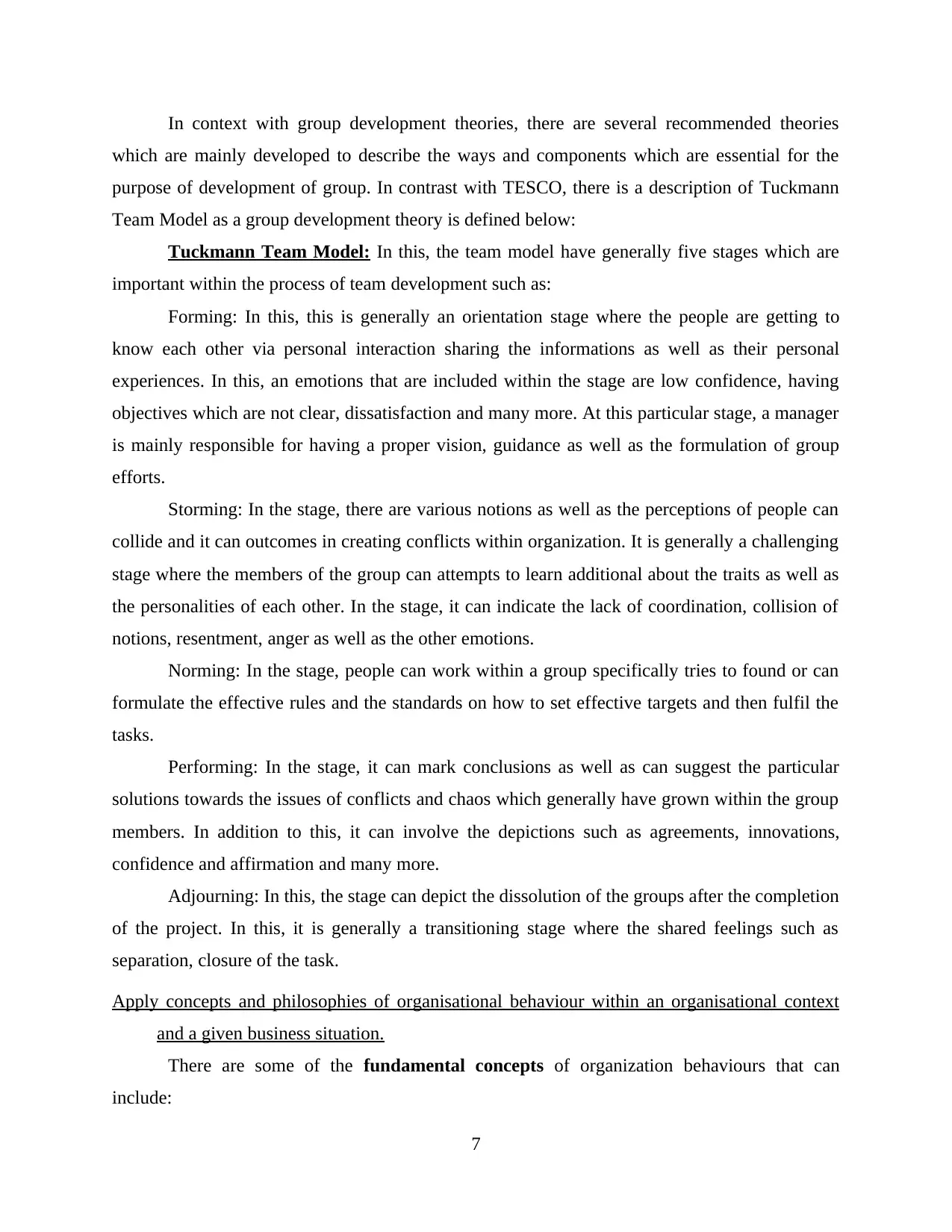
In context with group development theories, there are several recommended theories
which are mainly developed to describe the ways and components which are essential for the
purpose of development of group. In contrast with TESCO, there is a description of Tuckmann
Team Model as a group development theory is defined below:
Tuckmann Team Model: In this, the team model have generally five stages which are
important within the process of team development such as:
Forming: In this, this is generally an orientation stage where the people are getting to
know each other via personal interaction sharing the informations as well as their personal
experiences. In this, an emotions that are included within the stage are low confidence, having
objectives which are not clear, dissatisfaction and many more. At this particular stage, a manager
is mainly responsible for having a proper vision, guidance as well as the formulation of group
efforts.
Storming: In the stage, there are various notions as well as the perceptions of people can
collide and it can outcomes in creating conflicts within organization. It is generally a challenging
stage where the members of the group can attempts to learn additional about the traits as well as
the personalities of each other. In the stage, it can indicate the lack of coordination, collision of
notions, resentment, anger as well as the other emotions.
Norming: In the stage, people can work within a group specifically tries to found or can
formulate the effective rules and the standards on how to set effective targets and then fulfil the
tasks.
Performing: In the stage, it can mark conclusions as well as can suggest the particular
solutions towards the issues of conflicts and chaos which generally have grown within the group
members. In addition to this, it can involve the depictions such as agreements, innovations,
confidence and affirmation and many more.
Adjourning: In this, the stage can depict the dissolution of the groups after the completion
of the project. In this, it is generally a transitioning stage where the shared feelings such as
separation, closure of the task.
Apply concepts and philosophies of organisational behaviour within an organisational context
and a given business situation.
There are some of the fundamental concepts of organization behaviours that can
include:
7
which are mainly developed to describe the ways and components which are essential for the
purpose of development of group. In contrast with TESCO, there is a description of Tuckmann
Team Model as a group development theory is defined below:
Tuckmann Team Model: In this, the team model have generally five stages which are
important within the process of team development such as:
Forming: In this, this is generally an orientation stage where the people are getting to
know each other via personal interaction sharing the informations as well as their personal
experiences. In this, an emotions that are included within the stage are low confidence, having
objectives which are not clear, dissatisfaction and many more. At this particular stage, a manager
is mainly responsible for having a proper vision, guidance as well as the formulation of group
efforts.
Storming: In the stage, there are various notions as well as the perceptions of people can
collide and it can outcomes in creating conflicts within organization. It is generally a challenging
stage where the members of the group can attempts to learn additional about the traits as well as
the personalities of each other. In the stage, it can indicate the lack of coordination, collision of
notions, resentment, anger as well as the other emotions.
Norming: In the stage, people can work within a group specifically tries to found or can
formulate the effective rules and the standards on how to set effective targets and then fulfil the
tasks.
Performing: In the stage, it can mark conclusions as well as can suggest the particular
solutions towards the issues of conflicts and chaos which generally have grown within the group
members. In addition to this, it can involve the depictions such as agreements, innovations,
confidence and affirmation and many more.
Adjourning: In this, the stage can depict the dissolution of the groups after the completion
of the project. In this, it is generally a transitioning stage where the shared feelings such as
separation, closure of the task.
Apply concepts and philosophies of organisational behaviour within an organisational context
and a given business situation.
There are some of the fundamental concepts of organization behaviours that can
include:
7
⊘ This is a preview!⊘
Do you want full access?
Subscribe today to unlock all pages.

Trusted by 1+ million students worldwide
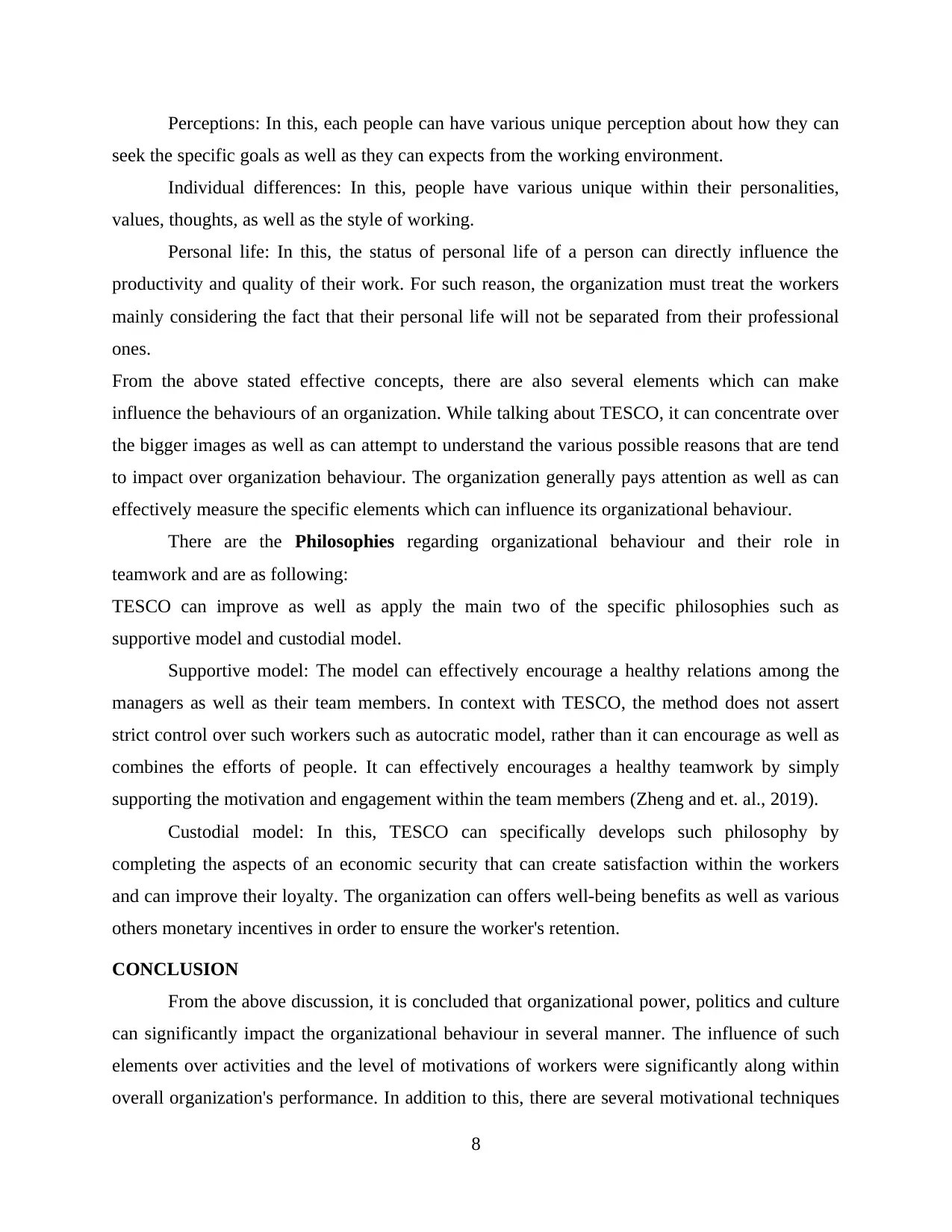
Perceptions: In this, each people can have various unique perception about how they can
seek the specific goals as well as they can expects from the working environment.
Individual differences: In this, people have various unique within their personalities,
values, thoughts, as well as the style of working.
Personal life: In this, the status of personal life of a person can directly influence the
productivity and quality of their work. For such reason, the organization must treat the workers
mainly considering the fact that their personal life will not be separated from their professional
ones.
From the above stated effective concepts, there are also several elements which can make
influence the behaviours of an organization. While talking about TESCO, it can concentrate over
the bigger images as well as can attempt to understand the various possible reasons that are tend
to impact over organization behaviour. The organization generally pays attention as well as can
effectively measure the specific elements which can influence its organizational behaviour.
There are the Philosophies regarding organizational behaviour and their role in
teamwork and are as following:
TESCO can improve as well as apply the main two of the specific philosophies such as
supportive model and custodial model.
Supportive model: The model can effectively encourage a healthy relations among the
managers as well as their team members. In context with TESCO, the method does not assert
strict control over such workers such as autocratic model, rather than it can encourage as well as
combines the efforts of people. It can effectively encourages a healthy teamwork by simply
supporting the motivation and engagement within the team members (Zheng and et. al., 2019).
Custodial model: In this, TESCO can specifically develops such philosophy by
completing the aspects of an economic security that can create satisfaction within the workers
and can improve their loyalty. The organization can offers well-being benefits as well as various
others monetary incentives in order to ensure the worker's retention.
CONCLUSION
From the above discussion, it is concluded that organizational power, politics and culture
can significantly impact the organizational behaviour in several manner. The influence of such
elements over activities and the level of motivations of workers were significantly along within
overall organization's performance. In addition to this, there are several motivational techniques
8
seek the specific goals as well as they can expects from the working environment.
Individual differences: In this, people have various unique within their personalities,
values, thoughts, as well as the style of working.
Personal life: In this, the status of personal life of a person can directly influence the
productivity and quality of their work. For such reason, the organization must treat the workers
mainly considering the fact that their personal life will not be separated from their professional
ones.
From the above stated effective concepts, there are also several elements which can make
influence the behaviours of an organization. While talking about TESCO, it can concentrate over
the bigger images as well as can attempt to understand the various possible reasons that are tend
to impact over organization behaviour. The organization generally pays attention as well as can
effectively measure the specific elements which can influence its organizational behaviour.
There are the Philosophies regarding organizational behaviour and their role in
teamwork and are as following:
TESCO can improve as well as apply the main two of the specific philosophies such as
supportive model and custodial model.
Supportive model: The model can effectively encourage a healthy relations among the
managers as well as their team members. In context with TESCO, the method does not assert
strict control over such workers such as autocratic model, rather than it can encourage as well as
combines the efforts of people. It can effectively encourages a healthy teamwork by simply
supporting the motivation and engagement within the team members (Zheng and et. al., 2019).
Custodial model: In this, TESCO can specifically develops such philosophy by
completing the aspects of an economic security that can create satisfaction within the workers
and can improve their loyalty. The organization can offers well-being benefits as well as various
others monetary incentives in order to ensure the worker's retention.
CONCLUSION
From the above discussion, it is concluded that organizational power, politics and culture
can significantly impact the organizational behaviour in several manner. The influence of such
elements over activities and the level of motivations of workers were significantly along within
overall organization's performance. In addition to this, there are several motivational techniques
8
Paraphrase This Document
Need a fresh take? Get an instant paraphrase of this document with our AI Paraphraser
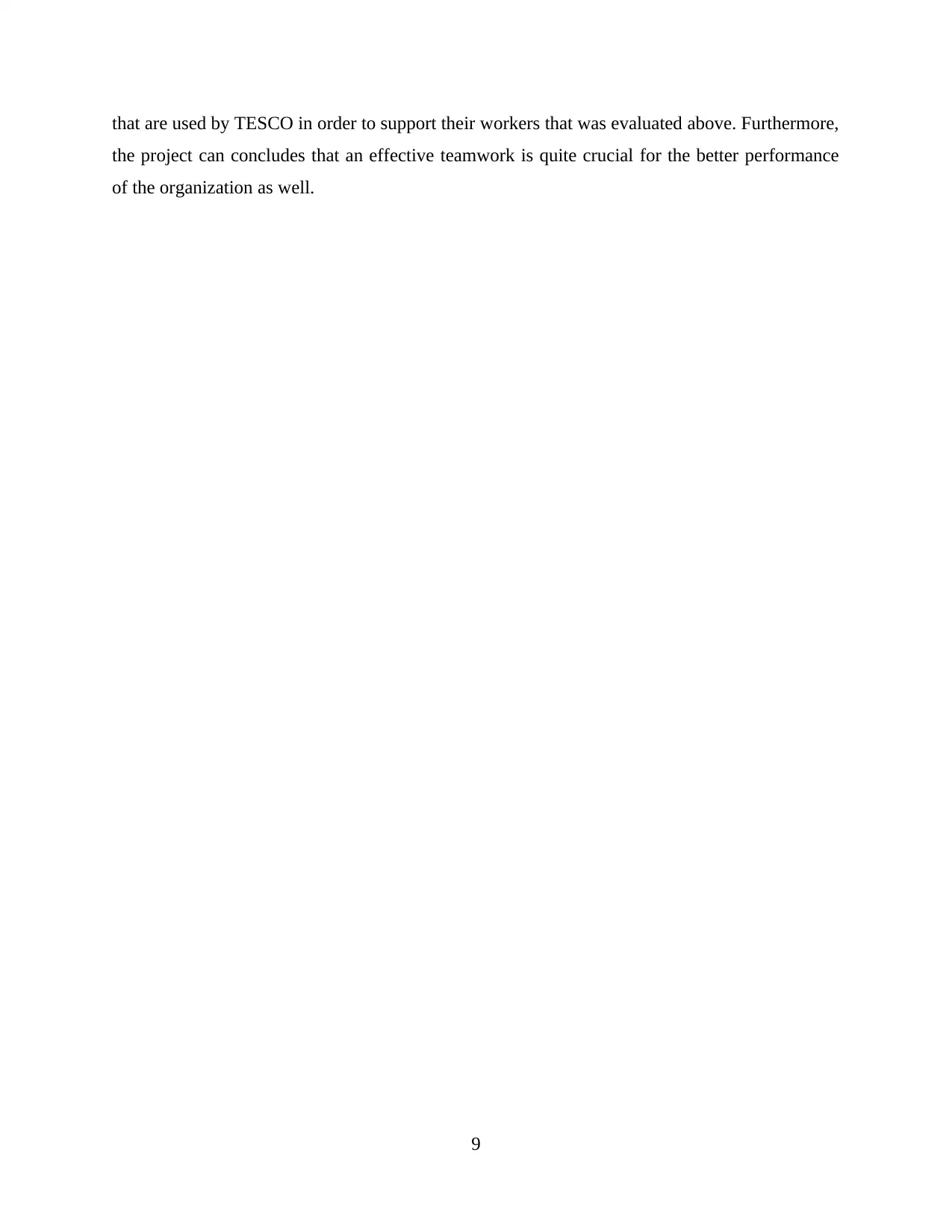
that are used by TESCO in order to support their workers that was evaluated above. Furthermore,
the project can concludes that an effective teamwork is quite crucial for the better performance
of the organization as well.
9
the project can concludes that an effective teamwork is quite crucial for the better performance
of the organization as well.
9
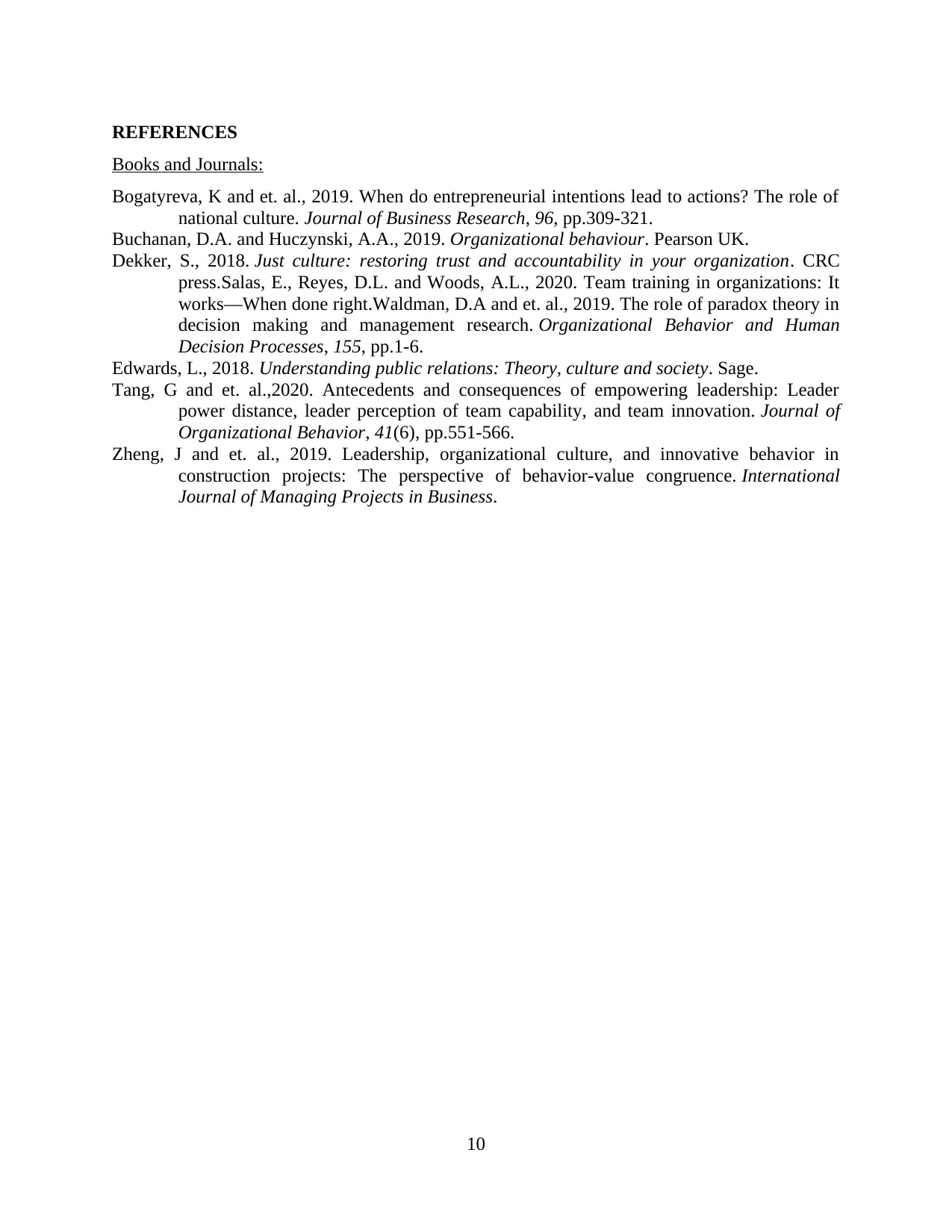
REFERENCES
Books and Journals:
Bogatyreva, K and et. al., 2019. When do entrepreneurial intentions lead to actions? The role of
national culture. Journal of Business Research, 96, pp.309-321.
Buchanan, D.A. and Huczynski, A.A., 2019. Organizational behaviour. Pearson UK.
Dekker, S., 2018. Just culture: restoring trust and accountability in your organization. CRC
press.Salas, E., Reyes, D.L. and Woods, A.L., 2020. Team training in organizations: It
works—When done right.Waldman, D.A and et. al., 2019. The role of paradox theory in
decision making and management research. Organizational Behavior and Human
Decision Processes, 155, pp.1-6.
Edwards, L., 2018. Understanding public relations: Theory, culture and society. Sage.
Tang, G and et. al.,2020. Antecedents and consequences of empowering leadership: Leader
power distance, leader perception of team capability, and team innovation. Journal of
Organizational Behavior, 41(6), pp.551-566.
Zheng, J and et. al., 2019. Leadership, organizational culture, and innovative behavior in
construction projects: The perspective of behavior-value congruence. International
Journal of Managing Projects in Business.
10
Books and Journals:
Bogatyreva, K and et. al., 2019. When do entrepreneurial intentions lead to actions? The role of
national culture. Journal of Business Research, 96, pp.309-321.
Buchanan, D.A. and Huczynski, A.A., 2019. Organizational behaviour. Pearson UK.
Dekker, S., 2018. Just culture: restoring trust and accountability in your organization. CRC
press.Salas, E., Reyes, D.L. and Woods, A.L., 2020. Team training in organizations: It
works—When done right.Waldman, D.A and et. al., 2019. The role of paradox theory in
decision making and management research. Organizational Behavior and Human
Decision Processes, 155, pp.1-6.
Edwards, L., 2018. Understanding public relations: Theory, culture and society. Sage.
Tang, G and et. al.,2020. Antecedents and consequences of empowering leadership: Leader
power distance, leader perception of team capability, and team innovation. Journal of
Organizational Behavior, 41(6), pp.551-566.
Zheng, J and et. al., 2019. Leadership, organizational culture, and innovative behavior in
construction projects: The perspective of behavior-value congruence. International
Journal of Managing Projects in Business.
10
⊘ This is a preview!⊘
Do you want full access?
Subscribe today to unlock all pages.

Trusted by 1+ million students worldwide
1 out of 12
Related Documents
Your All-in-One AI-Powered Toolkit for Academic Success.
+13062052269
info@desklib.com
Available 24*7 on WhatsApp / Email
![[object Object]](/_next/static/media/star-bottom.7253800d.svg)
Unlock your academic potential
Copyright © 2020–2026 A2Z Services. All Rights Reserved. Developed and managed by ZUCOL.



